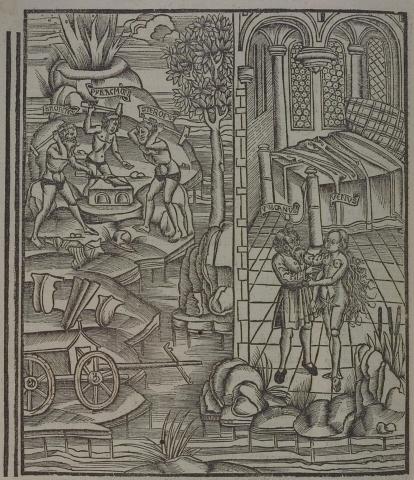CORE VOCABULARY
quiēs, ētis, f.: rest, repose, 3.495; sleep, 2.268; respite, intermission, 1.723.
abigō, ēgī, āctus, 3, a.: to drive off or away from, i.e. beyond (others in), 8.407; drive away, 11.261. (ab and agō)
curriculum, ī, n.: career, course, 8.408. (currō)
expellō, pulī, pulsus, 3, a.: to drive out; drive or carry up; banish, 1.620; repel, drive, 10.354.
tolerō, āvī, ātus, 1, a.: to sustain; support, maintain, 8.409; endure, 8.515. (cf. tollō)
colus, ī and ūs, f.: a distaff, 7.805; spinning, 8.409. (rarely m.)
tenuis, e: adj. (cf. tendō), stretched out; slender, thin, 4.278; light, 3.448; little, 10.511; airy, ethereal, 6.292; delicate, fine, 4.264; scanty, yielding a scanty livelihood, 8.409; reduced, perishing, sinking, 5.690; simple, trivial, humble.
Minerva, ae, f.: an Italian goddess, understood to be the same as the Greek Athena; the goddess of wisdom, of the liberal and industrial arts, and of systematic or strategic warfare, 2.31, et al.; (meton.), wisdom, wit; household work, spinning, the loom, etc., 5.284, et al.
sōpiō, īvī or iī, ītus, 4, a.: to put to sleep; p., sōpītus, a, um, lulled to sleep, 1.680; slumbering, 5.743. (sopor)
suscitō, āvī, ātus, 1, a.: to stir up, turn up; to rekindle, 5.743; rouse, incite, 2.618; call forth, 8.455.
famula, ae, f.: a female house slave; maidservant, 1.703. (famulus)
pēnsum, ī, n.: that which is weighed out or assigned for a day's spinning; a day's work; task, 8.412; a web, 9.476. (pendō)
cubīle, is, n.: a lair, bed, couch, 3.324. (cubō, lie down)
possum, potuī, posse, irreg. n.: to be able; can, 1.242, et al.; to avail, have influence, power, 4.382. (potis and sum)
secus: following, late; otherwise, differently; nōn or haud secus, not otherwise, not less; likewise, even so, 2.382, et al.; none the less, nevertheless, 5.862; haud secus ac, nor otherwise than, just as. (comp. adv.), sētius, less, the less; haud sētius, not the less, 7.781.
īgnipotēns, entis: adj. (īgnis and potēns), having power over fire; subst., Īgnipotēns, the fire-god, Vulcan, 10.243.
nec or neque: (adv. and conj.), and not; neither, nor, 1.643, et al.; in prohibition, 3.394, et al.; neque (nec) — neque (nec), neither — nor, 5.21, et al.; nec — et, or -que, may be rendered neither — nor, 12.801; 2.534; nec nōn, and also, nor less, 6.183; nec nōn et, and also, 1.707.
tempus, oris, n.: 1. Time in general, a period, time, 1.278; interval or space of time, 4.433; crisis, circumstance, juncture, 7.37; season, fitting time, opportunity, proper moment, 4.294; ex longō (tempore), in or for a long time, 9.64. 2. The temple of the forehead, 9.418; commonly pl., 2.684; of animals, 12.173.
sēgnis, e: (adj.), tardy, sluggish, dilatory, backward, 11.736; slothful, inactive, 3.513; mean-spirited, cowardly, 9.787; helpless, 10.700; (fig.), idle, exhausted; comp., sēgnior, less glorious, less divine, 4.149; less rapid, 7.383.
strātum, ī, n.: that which is spread out; a layer, cover; bed, couch, 3.513; pavement, 1.422. (sternō)
fabrīlis, e: adj. (faber, smith), pertaining to a smith; forging, 8.415.
Sicānus (Sicānius), a, um: adj. (Sicānī), Sicilian, Sicanian, 5.24, et al.
iūxtā: (adv. and prep. w. acc.), near, close, near by, 2.513; at the same time, 2.666; near to, 3.506.
Aeolius, a, um: (adj.), pertaining to Aeolus; Aeolian, 5.791.
ērigō, rēxī, rēctus, 3, a.: to raise up, rear, erect, 4.495; cast upward, 3.423. (ex and regō)
Liparē, ēs, f.: Lipara or Lipare, one of the Aeolian Islands, N.E. of Sicily, 8.417.
fūmō, āvī, ātus, 1, n.: to smoke, 3.3, et al.; send up vapor; fume, reek, 2.698; foam, 12.338. (fūmus)
arduus, a, um: (adj.), steep; erect, high, raised high, 2.475; 5.480; lofty, towering, 2.328; rearing, 11.638.
subter: (prep. w. acc. and abl.), below, beneath, under, 3.695; beneath, 4.182. (sub)
specus, ūs, m., f., and n.: a cave, cavern; cavity, deep wound, 9.700.
Cyclōps, ōpis, m.: a Cyclops, one of the Cyclopes, fabulous giants of Sicily, supposed to have a round eye in the middle of the forehead, 3.569.
exedō, ēdī, ēsus, 3, a.: to eat out, hollow out, devour; consume, destroy, 5.785.
camīnus, ī, m.: a furnace; forge, 6.630; crevice, cavity, 3.580.
antrum, ī, n.: a cave, cavern, grotto, 1.166.
Aetnaeus, a, um: adj. (Aetna), of Aetna; Aetnaean, 3.678.
tonō, uī, 1, n. and a.: to thunder, 3.571, et al.; of speech, 11.383; (with acc.), utter, invoke with a loud voice, thunder forth, 4.510.
incūs, ūdis, f.: an anvil, 7.629. (incūdō, to beat)
gemitus, ūs, m.: a groaning; a groan, 3.39, et al.; sigh, 1.485; lamentation, 2.486; cry, 2.413; noise, roaring, 3.555. (gemō)
strīdeō, 2, n., and strīdō, strīdī, 3: to produce a grating or shrill sound; to creak, 1.449; gurgle, 4.689; rustle, 1.397; whiz, roar, 1.102; hiss, 8.420; twang, 5.502.
caverna, ae, f.: a hollow; cavern, 2.53, et al. (cavus)
strīctūra, ae, f.: a mass or bar of hot iron, 8.421. (stringō)
Chalybes, um, m.: a people of Pontus, skillful in making steel; the Chalybes; (meton.), masses of steel or iron, 8.421; metalla Chalybum, mines of iron, 10.174.
fornāx, ācis, f.: a furnace; forge, 7.636.
anhēlō, āvī, ātus, 1, n. and a.: to pant, 5.254; of a furnace, to puff, roar, 8.421. (am- and hālō)
Vulcānus, ī, m.: the god of fire and of the forge, son of Jupiter and Juno, 8.422; (meton.), fire, 2.311, et al.
Vulcānius, a, um: adj. (Vulcānus), pertaining to Vulcan; forged or wrought by Vulcan, 12.739, et al.; of fire or flame, 10.408.

